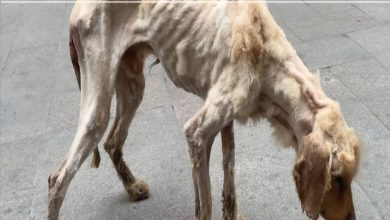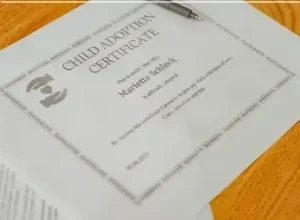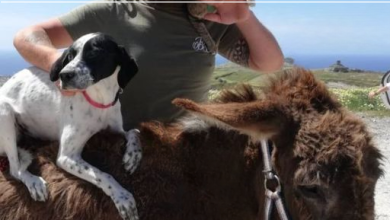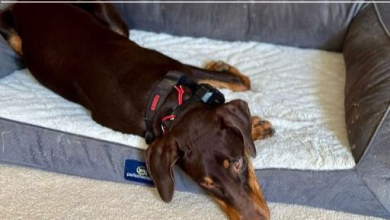In a bustling airport, something remarkable was about to unfold
Bruno, a calm and devoted dog, sat quietly beside his owner, Daniel—a man whose eyes held both anticipation and sorrow. Daniel was headed to start a new chapter in a distant country, a chance to rebuild his life. But there was a catch: Bruno, his beloved companion, couldn’t fly in the cargo hold because of his size and health.
Daniel, heart in his throat, begged the airline staff. “Please… I can’t leave him,” he murmured, clinging to Bruno like letting go would break him.
What happened next felt like a miracle. Touched by the unmistakable love between the two, the flight crew chose to make an exception. “We’ll find space in the cabin,” one of them said kindly. After some reshuffling and cooperative passengers, Bruno was gently nestled into a seat, wrapped in Daniel’s arms like a child.
As the plane soared into the sky, Bruno stayed perfectly still. No barking, no nervous fidgeting—just silent, unwavering trust. It was as if he understood this flight was their one shot to stay together.
Initially skeptical travelers were soon won over. A woman nearby gently stroked Bruno’s head. A man ahead turned around to snap a photo. One flight attendant whispered with a smile, “He’s the best passenger on board.”
Throughout the flight, Daniel held Bruno close, whispering softly, grateful for every second together. And when the plane finally touched down, he turned to his dog with tears in his eyes. “We did it, buddy.”
That journey wasn’t just about reaching a destination. It was a testament to love that refuses to be left behind. That day, an airline broke a rule—but more importantly, they made history in the heart of a man and his dog.
After landing, Daniel and Bruno stepped into a city full of unfamiliar sights and sounds—foreign signs, new languages, and strangers rushing past. With one hand gripping his carry-on and the other holding Bruno’s leash, Daniel took a deep breath and stepped forward. Every time doubt crept in, Bruno brushed against him as if to say, we’ve made it this far—we’ll be okay.
Daniel had arranged a small month-long rental that accepted dogs. It wasn’t much—just a modest studio with a cramped kitchenette and a spot by the window where Bruno could curl up. But to Daniel, it was sanctuary. “It’s not fancy,” he told Bruno, “but it’s ours—for now.”
The next day, the two of them explored their neighborhood. Bruno sniffed every corner, tail wagging, while Daniel found comfort in a nearby park. In the middle of that city of strangers, the little green space felt like a moment of peace.
But reality soon set in. Money was tight, and job opportunities were scarce. Daniel started applying to everything he could find—from translation work to retail. Within two weeks, he landed a part-time job at a small café run by a warm-hearted woman named Lucinda. She welcomed Bruno too, placing a water dish outside just for him.
It was the first of many gestures of kindness.
One rainy day, an elderly couple stopped by the café and immediately recognized Bruno. A local news story about a dog allowed to fly in-cabin had quietly gone viral. Moved by the tale, they spoke with Daniel, listened to his journey, and left him a generous tip. “That dog’s lucky to have you,” they said. “But you’re lucky to have him, too.”
Finding long-term housing was harder. Many landlords were hesitant about Bruno’s size. Despite his gentle demeanor, the moment his breed came up, doors quietly closed. Daniel grew discouraged as each lead fell through.
Time was running out.
During their final week in the studio, a small ray of hope arrived. A customer from the café mentioned an elderly retired vet named Kiara, who might have a room available. Nervous but hopeful, Daniel and Bruno took the bus out to see her.
Kiara’s home was cozy, with a fenced yard and three curious cats. The moment she met Bruno, her face lit up. She knelt to greet him, her voice soft and welcoming. “Well, aren’t you a sweetheart.” After hearing their story, she smiled. “If you two can get along with three opinionated cats, I think we can make this work.”
Daniel was overwhelmed. It wasn’t just a roof—it was acceptance, warmth, and a fresh start. They moved in a few days later.
Bruno had never lived with cats, but he adapted quickly. At first, the cats eyed him from high perches. But in time, trust grew—especially with Moki, Kiara’s gray tabby, who one day curled up beside Bruno for a nap. It was a quiet moment that spoke volumes.
Life wasn’t without challenges. When one of the cats, Clover, fell ill, Kiara worried over the vet bills. Without hesitation, Daniel offered to help, even if it meant tapping into his savings. “You opened your home to us,” he said. “This is the least I can do.” Kiara’s gratitude was wordless, her eyes misty.
Daniel took extra café shifts to cover the costs. Clover recovered. And the bond in their little home deepened.
Meanwhile, Daniel became a familiar face in the café. Lucinda taught him to bake, to handle the register, and to engage with the regulars. Bruno waited patiently outside, drawing smiles and affection from passersby. Slowly, Daniel learned the language—one phrase at a time—thanks to kind customers and Kiara’s dinner-table tutoring.
When not working, Daniel and Bruno explored. They wandered by rivers, ducked into tiny bakeries, and took short train rides to nearby towns. People often recognized Bruno from the story, and Daniel was humbled by their kindness.
Then, everything changed.
A marketing firm Daniel had contacted months ago finally reached out. They needed a bilingual assistant to expand their outreach. After an interview, he got the job. The salary meant financial stability. Though he promised Lucinda he’d always help when needed, Daniel now had a real foothold in his new life.
He enrolled in evening classes. Kiara practiced conversation with him every night. Bruno thrived in the yard, dozing in the sun, now fully settled.
One evening, Kiara cooked a special meal. “This house feels alive again,” she said, smiling warmly. The table was set with soup, fresh bread, and even a small dish for Bruno. As they sat together, Daniel thought about how far they’d come—from the airport heartbreak to this home of laughter and love.
Watching Bruno doze by the fire, Daniel knew he had made the right choice.
Raising his glass, he offered a quiet toast. “To second chances. To the people who make room for strangers. And to the animals who teach us what love really looks like.”
Kiara clinked her glass against his, smiling through tears.
From that point on, life had rhythm and grace. Their shared home was full of joy and quiet miracles. Daniel’s new job challenged and inspired him. And Bruno, the dog who was nearly left behind, reminded him every day that love is worth fighting for.
He had left his old life behind—but what he found was something richer: proof that kindness creates miracles, and that the simplest acts—an airline’s compassion, a stranger’s generosity, a shared meal—can completely transform a life.
Sometimes, one small act of grace can rewrite someone’s entire story.
Whether it’s making room for someone who needs it—or simply believing in them when no one else will—compassion always leaves a legacy.
If this story touched you, share it. Let’s remind the world that love, loyalty, and second chances still matter—and they’re closer than we think.




